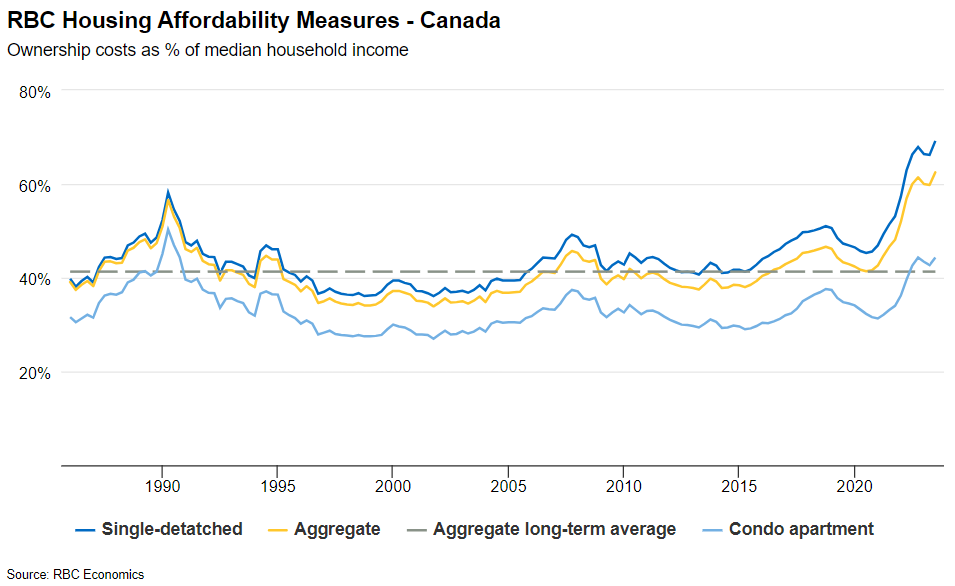Update Dec 14, 2024: Added Newsletter Email Archive at End of Post.
People leaving Ontario for other provinces was a headline that really took off during the pandemic. Everyone was forced to work remotely and it opened up opportunities for mobility. It made good financial sense that you could keep your big city salary and move to a lower cost of living area to make your money go further. This led to a spike in inter-provincial migration numbers and local rural properties becoming more expensive as people left larger cities to find more space. However, for some people the choice to move may have backfired. I am aware of more than one person who moved out from Toronto with the expectation that they would be able to work from home for the rest of time and they ended up moving back in 2022 or 2023.
Migration out of Ontario has been quite variable over the years, from 2003-2015 there was net out-migration to other provinces, from 2016-2019 there was net in-migration, then largely due to the pandemic and skyrocketing housing costs Ontario saw out-migration from 2020-2022. However, Ontario is far from the worst. People have been leaving Quebec, Saskatchewan, and Manitoba every year since 2015 for other provinces. Alberta only recently saw more people come in than leave, as of 2021. Most of the Maritime provinces saw significant proportional spikes during the pandemic.
I could go on and on listing different datapoints, and really it wouldn’t matter all that much since the numbers of total migration between provinces barely tops 100,000 people per year in most years. When we’re bringing in 1,000,000 new residents to Canada in one year we have a larger issue at hand. The more important trends would be to see where people immigrate to, and as you might imagine people will immigrate to where they have the largest networks, or where the most jobs are which tend to be the larger cities. This means that the supply crunch in the Greater Toronto Area is not likely to see relief because people are unlikely to choose to immigrate or migrate in large numbers to other provinces where they don’t have a support network and fewer job opportunities. People want to be where things are happening, and the largest city in Canada, tends to be a solid go to choice.
If you have taken a trip on the TTC at some point in the past 2 years you would have likely seen at least one advertisement encouraging you to move to Alberta. The campaign Alberta’s provincial government came up with is called “Alberta is Calling” and they are pitching Alberta as “affordable, friendly, and rich in opportunity.” I’ve only been to Alberta once for a wedding in Banff, and from that experience I can say that it does have a lot of natural beauty. But from the news this past week, I can also say that it’s cold. -40° C cold. The -10° C in Toronto today feels downright balmy compared to that. Like most of Canada the cold doesn’t last forever and it does eventually just become part of your life, but I can’t help but point out the weather conditions as someone who prefers it to be a bit warmer.
I also want to touch on an article that I came across recently regarding Alberta’s immigration + migration capacity. As mentioned earlier, the whole of Canada is having a bit of a problem handling the number of people that immigrate here every year. Alberta’s campaign worked so well that there is a concern that they will not be able to meet the higher demands on their services like healthcare and education. They had 194,000 people come to the province last year which is a 4.3% increase in population. With the way things are going in Alberta and across the country. The investments and preparation to provide these types of services to a population influx has to take place years or months in advance. There is some concern that Alberta will not be able to just flip the switch to meet this new found demand. Eventually this problem will improve itself with the increased tax revenue from these new residents. But it will be reactionary, as most big moves in politics tend to be. Planning ahead seems to be verboten.
I do completely understand why some people might want to move to cheaper provinces with the current housing prices in Ontario and British Columbia. But comparing and contrasting Ontario with British Columbia shows an interesting trend. In 2020 Ontario saw net out-migration of -18,405, in 2021 it was -47,212. Surprisingly, or maybe unsurprisingly, British Columbia saw net in-migration throughout the pandemic. In the last 50 years BC has only seen 12 years where more people left the province than moved to it. Clearly, even with the highest costs of housing in the country, it is a place that people will sacrifice a lot, in order to have the pleasure of living there. If Alberta’s push to get people to move continues to be successful it is likely that a large number of the migrants into the province will come from British Columbia simply due to proximity, and of course high housing costs. As someone who has never been to BC but has dreamed of going there more than a few times, the pull of BC is quite strong.
The moral of all these inter-provincial migration numbers is that housing is still a crisis. People are not just contemplating moving to less expensive provinces, but are actually doing it. I believe this trend will continue for the foreseeable future, even with the historical investments in housing from all levels of government. Our economies have become so centralized, data is so accessible, and financial systems have enabled us to borrow huge amounts of money to purchase homes. We’ve underinvested in trades, have high numbers of immigration, and anticipate lower interest rates coming over the next decade. All of these factors combine to create a housing supply shortage and a financial system that will both work together to keep prices going up. We’re in a situation now that if prices do fall significantly it likely means there are much bigger problems in Canada than just housing. I want to be hopeful that this problem can be solved by a combination of investing in trades and housing. But I’m not sure that will be enough. It will be interesting to keep an eye on the migration trends in the coming years and I do wonder if at some point we will see emigration out of Canada, or if BC’s natural beauty will be enough to make people want to stay.
Keep Investing,
Oliver Foote
Newsletter #6: Alberta is Calling, RBC Economics & Housing Affordability

Welcome to another newsletter! Lots of fun stuff this week, RBC came out with a super interesting, somewhat shocking chart on housing affordability vs. median income. I talk about what Interprovincial Migration trends say about housing costs and how the pandemic has changed our mobility and more! Have a great week!
This Weeks Blog Post:
Why Are People Leaving Ontario for Other Provinces?:
- Alberta’s successful campaign to attract residents
- Will Alberta be able to provide services to their new influx of residents?
- Will people leaving larger provinces relieve the supply crisis?
Read the full blog post here: https://oliverfoote.ca/2024/01/21/why-are-people-leaving-ontario-for-other-provinces/
Housing News:
- 5-yr Canadian bond rate seems to be trending upwards again from a recent low. Locking in a fixed rate mortgage at the end of Dec/start of Jan is proving to have been good timing, now is still a very good time based on the past 6 months.
- Activity in the market does seem to be picking up somewhat for well presented and well priced homes. Many mispriced homes with unmotivated sellers continue to sit on the market.
- Hamilton to create a bylaw preventing renovictions: CTV News Article
- RBC: Affordability at an all time low
Graph: ownership costs, as a % of median household income:

Market Performance as of close Friday Jan 19, 2024:
S&P 500: 4,839.81 (+2.04% YTD)
NASDAQ: 15,310.97 (+1.70% YTD)
S&P/TSX Composite: 20,906.52 (+0.16% YTD)
Canada CPI Inflation Dec 2023: 3.4% (0.3% Increase from Nov 2023)
Current BoC Benchmark Interest Rate: 5% NC
Current Prime Lending Rate: 7.2% NC
Unemployment Rate Nov 2023: 5.8% NC
All the best,
Oliver